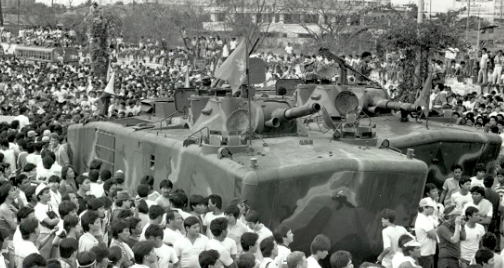CURRENT AFFAIRS UNIT, RADIO KWARA, ILORIN
PROGRAMME: NEWS COMMENTARY
DATE OF BROADCAST: 7/10/88 AT 1810 HOURS
WRITER: LANRE KAWU
The resounding success scored by the Chilean opposition, at a recent referendum, was like the proverbial final straw. It signalled the definitive end of the tragedy of President Pinochet, which commenced in 1973, and once again, confirmed the potency of the doctrine of People’s Power. Two years ago, a well-coordinated uprising of the Philipino people terminated the dictatorship of President Ferdinand Marcos, while a similar reign of “President-for-life Jean Claude Duvalier”, in Haiti was also ended.
In the age of the information revolution, that has brought the world closer than ever before, people in the different countries could watch these dramatic developments on television. A seemingly docile people in Burma also recently woke up to discover the ability to teach long-established dictators, how to resign from office. Indeed, on a world-wide scale, the peoples are waking up to assert their dignity, are calling for democracy, and cannot put up forever, with regimes that belong in the Middle Ages.
What is happening in the different countries of the world, must be properly situated within the ambits of the developments of the past few decades. In practically all the countries that have witnessed the manifestations of People’s Power, we can notice a disastrous ruination of the national economies, the abject poverty of the mass of the peoples, and the entrenchment of the power of the transnational corporations and imperialism.
Unable to satisfy the yearnings of the population, encouraged to play the surrogates of the imperialists, these regimes could only be authoritarian, wiping out every form of opposition. In Latin America, for instance, Chile became the test-ground of the doctrines of the so-called Chicago School of Economic Sciences, headed by Milton Friedman. The salient features of the doctrine, allowed for financial speculation, which benefitted mainly imperialism and the local oligarchy; encouraged the inflow of foreign goods, and stifled the local industries.
By the time the bubble began to burst, the Chilean economy was in a lot of trouble, while unemployment and other social difficulties, that were being systematically removed under the Popular Unity government of President Salvador Allende, were exacerbated. It became clear, that the military dictator Augustus Pinochet had to go. In order to ensure that, the people moved into the streets. They defied the clubs, the teargas, water canons and the bullets.
The Duvalier regime unleashed a reign of terror in Haiti, with its much-feared “Toton Macoute”, licensed to kill. Haiti, the first Black nation to achieve independence in 1804, was turned into a huge death camp. Today, Haiti is the poorest country in the Western Hemisphere. The economy is in ruins, social services are non-existent, and the people drag out a livelihood that belong in the realms of horror cinema.
For many years, President Ferdinand Marcos ruled the Philipines, as a personal fiefdom. He looted funds, silenced the opposition, but was extolled by successive American administrations. This was because he allowed the United States to keep is two biggest military bases in the Pacific Region, at Subic Bay and the Clarke Air Bases. But even that could not save him. When the people of the Philipines decided that he had to go, the Americans could only do him a last favour of providing the aircraft to abscond to the Hawaii Islands.
In particularly all the instances where the dictatorships have been eliminated, it was the mass of the people of these countries that went into the streets, to call for democracy. The fundamental lesson to learn is that governments, must get their legitimacy, not from foreign institutions, but from the sovereign people of their countries. The manifestation of People’s Power has not been a feature of the African political landscape, save in the Sudan, President Jaafar Numeiri was removed two years ago. The continent is still the breeding ground for Presidents-for-life, Sergeants-turned-Presidents, and elections where the incumbents win 99% of the votes cast.
In the meantime, the continent groans under the heavy weight of foreign debt, poverty, unemployment, and other social malaises. If the present situation persists, then one will not need a crystal ball, to be able to predict a future of people power in Africa. It can only be for the best. Africa on the threshold of the new millennium, needs genuine democracy, rooted in the mass of its toiling people. It is in consonance with the march of world history. Indeed, People’s Power, has become a veritable scourge of the sit-tight dictatorships.


